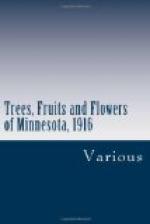After planting comes the cultivating, which should be kept up all summer. Especially after a rain should the ground be stirred to keep it from baking. In exceedingly dry seasons by keeping a dust mulch around the plants one can avoid having to do much watering—for unless you water thoroughly at such a time it is better not to water at all. However, if it finally becomes necessary to apply water, the dust mulch has kept the ground in condition to absorb all the water that is used.
In the fall after the ground has frozen a light covering of some kind should be thrown over the plants. This is to protect them from the thawing and freezing that takes place from time to time during the winter and early spring. After the first year, when the foliage has increased so as to be some protection, it is not as necessary to cover, although no doubt a little more covering would be beneficial. Some growers of the peony, however, advocate cutting off the leaves in the fall, and in such a case a covering would be necessary.
We found a very satisfactory way for both covering and fertilizing was to throw a fork full of dressing around each plant in the fall and work it into the ground in the spring.
IN MEMORIAM—J. F. BENJAMIN.
PASSED JULY 15, 1916. AGED 59 YEARS.
“John Franklin Benjamin was born at Belvidere, Illinois, May 6, 1857. That same year his parents moved to Hutchinson and he, at the age of five years, was one of the two score of little children who spent hours of terror in the stockade when it was attacked by the Indians on September 4, 1862. As he grew up he attended the Hutchinson school, his boyhood being spent on the farm. He was married in October, 1889, to Minnie L. Walker. The following year they moved to Pierce county, Neb., where Mr. Benjamin purchased and for ten years managed a large ranch. In 1890 they returned to Hutchinson and proceeded to open and improve Highland Home Fruit Farm, which was thenceforth Mr. Benjamin’s abiding place until the summons came that ended all his earthly hopes and plans.
“He was an active factor in farmers’ co-operative society affairs and supported all movements for the moral and educational uplift of the community. He had been for many years a member of the M. E. church and of the Woodmen’s and Royal Neighbors’ camps and a valued and active member of each of these societies.
[Illustration: John Franklin Benjamin.]
“Mr. Benjamin left no children, and the wife who has been his devoted helpmate for twenty-seven years survives to face the coming years of bereavement alone.
“His had been a useful life, a life of ceaseless and honorable toil, and that beautiful and valuable property, Highland Home Fruit Farm, largely the product of the work of his own hands, is a monument to his memory which will long endure to be admired and enjoyed by others as one of the model rural places of Minnesota. Few men in the space of twenty-five years have accomplished more than did J. F. Benjamin in establishing the fine, modern home, the large orchard and small fruit and flower gardens and well stocked farm, all of which he had tended with loving hands.”




